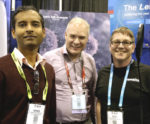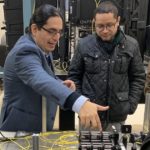Today marks the launch of insideHPC’s new National Lab News portal, a service for the HPC community that highlights and aggregates the use of HPC technologies at supercomputing centers in the United States and around the world. You can access the portal by clicking on the header in the insideHPC navigation bar, (“National Lab News”), articles will be listed….
@HPCpodcast: All Things Quantum from 3 Practitioners at Brookhaven Lab (Guess Which Quantum Platforms They Use?)
Brookhaven National Laboratory’s Kerstin Kleese van Dam, Gabriella Carini, and Meifing Lin join Shahin and Doug to discuss all things quantum, covering quantum sensing, quantum networks and quantum computing. These women are the front lines of HPC and quantum, discussing the state of quantum capabilities today, workloads in which quantum delivers advantages over classical computing, and the challenges of quantum from an experience-based point of view.
DOE SciDAC: $30M Awarded to 5 National Labs for Research on High Energy Physics through Advanced Computing
Sept. 21, 2022 — Today, the U.S. Department of Energy (DOE) announced $30 million in funding for five projects in computation and simulation techniques and tools to understand the universe via collaborations that enable effective use of DOE high-performance computers. The Scientific Discovery through Advanced Computing (SciDAC) partnership in high energy physics brings together applied mathematicians and […]
DOE: $26M Awarded to Labs, Universities to Advance Chemical Materials Sciences with Data Science
The U.S. Department of Energy (DOE) announced $26 million in research funding to harness research tools for clean energy solutions. The 10 projects announced today will help scientists to unleash the power of data science —including artificial intelligence and machine learning (AI/ML)—on experiments, theory, and computation-based methods to tackle the basic science challenges that will […]
3 National Labs Join ATOM Consortium for Drug Discovery
MARCH 29, 2021 — The Accelerating Therapeutics for Opportunities in Medicine (ATOM) consortium today announced the U.S. Department of Energy’s Argonne, Brookhaven and Oak Ridge national laboratories are joining the consortium to further develop ATOM’s artificial intelligence (AI)-driven drug discovery platform. The public-private ATOM consortium aims to transform drug discovery from a slow, sequential and high-risk process […]
Brookhaven’s Advanced Computing Lab Expands with DDN A3I Storage and Nvidia DGX-2
High performance storage vendor DDN, provider of AI and data management software and hardware solutions, today announced Brookhaven National Laboratory has selected DDN’s A3I AI400X all-NVME flash appliance storage for fast optimum experimental design for its Computational Science Initiative (CSI). Brookhaven National Laboratory plans to use DDN products along with the Nvidia DGX-2 AI supercomputer to expand its project […]
Taking a Virtual Turn, ModSim 2020 Focuses on the AI Era
From the front lines of this year’s ModSim conference, Charity Plata, Computational Science Initiative, Communications, Brookhaven National Laboratory, send this report: Recently, the ninth annual Workshop on Modeling & Simulation of Systems and Applications, known as ModSim 2020 — usually a 2.5-day event held amid the picturesque backdrop of the University of Washington Botanic Gardens in […]
Podcast: Rewriting NWChem for Exascale
In this Let’s Talk Exascale podcast, researchers from the NWChemEx project team describe how they are readying the popular code for Exascale. The NWChemEx team’s most significant success so far has been to scale coupled-cluster calculations to a much larger number of processors. “In NWChem we had the global arrays as a toolkit to be able to build parallel applications.”
ExaLearn: The ECP Co-Design Center for Machine Learning
In this video from the HPC User Forum, Frank Alexander from Brookhaven National Laboratory presents: ExaLearn – ECP Co-Design Center for Machine Learning. “It is increasingly clear that advances in learning technologies have profound societal implications and that continued U.S. economic leadership requires a focused effort, both to increase the performance of those technologies and to expand their applications. Linking exascale computing and learning technologies represents a timely opportunity to address those goals.”
DOE Extending Quantum Networks for Long Distance Entanglement
Scientists from Brookhaven National Laboratory, Stony Brook University, and DOE’s Energy Sciences Network (ESnet) are collaborating on an experiment that puts U.S. quantum networking research on the international map. Researchers have built a quantum network testbed that connects several buildings on the Brookhaven Lab campus using unique portable quantum entanglement sources and an existing DOE ESnet communications fiber network—a significant step in building a large-scale quantum network that can transmit information over long distances.









